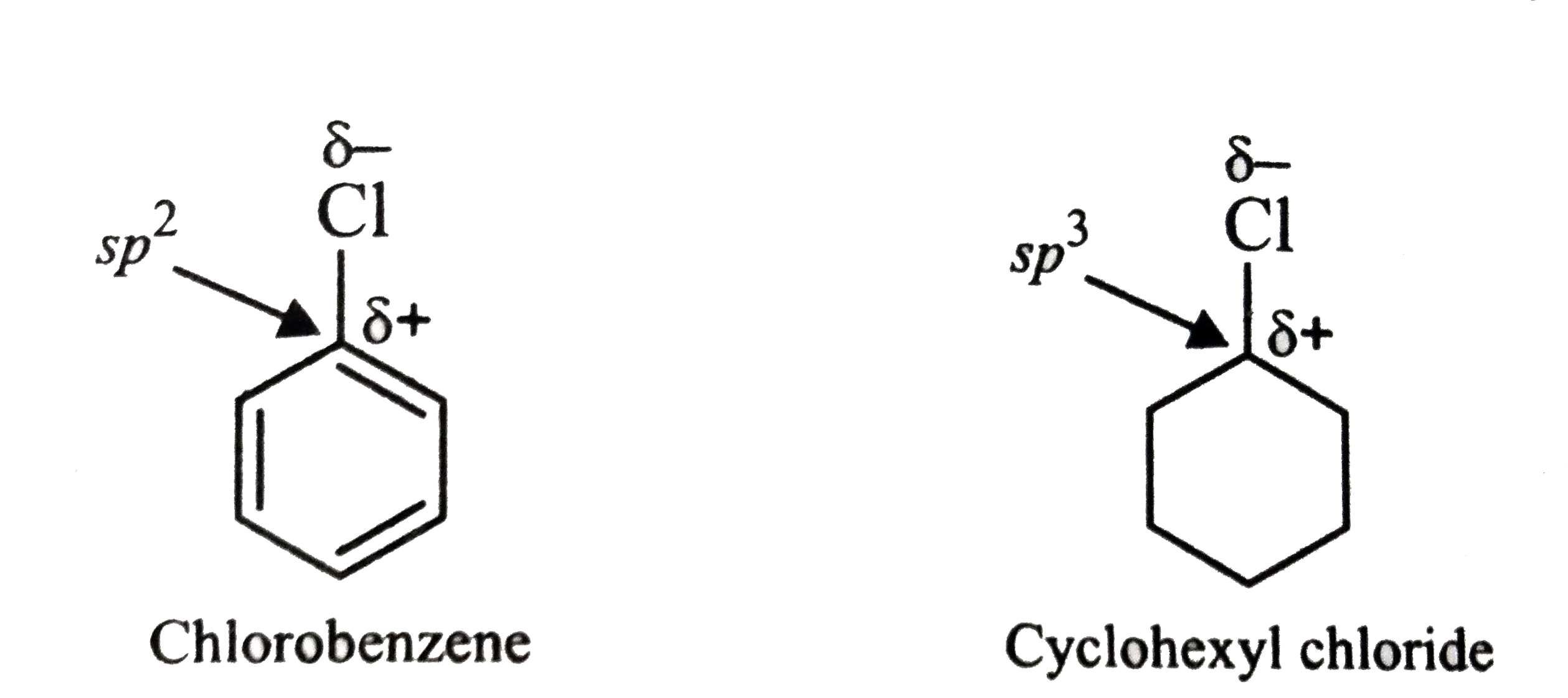The dipole moment of vinyl chloride is lower than that of methyl chloride. This is due to
In chlorobenzene, Cl is attached to a sp2-hybrid carbon while in cyclohexyl chloride, it is attached to a sp3-hybrid carbon.

The sp2-hybrid carbon due to greater s-character is more electronegative than a sp3-hybrid carbon. therefore, sp2-hybrid carbon of C-Cl bond in chlorobenzene has less tendency to release electrons to the Cl atom than a sp3-hybrid carbon in cyclohexyl chloride. As a result, C-Cl bond in chlorobenzene is less polar than in cyclohexyl chloride. in other words, chlorobenzene has lower dipole moment (1.69 D) as compared to that of cyclohexyl chloride (1.86 D).
Topper's Solved these Questions
- BOOK - PRADEEPCHAPTER - HALOALKANES AND HALOARENESEXERCISE - ADDITIONAL QUESTIONS (SHORT ANSWER QUESTIONS)47videos
HALOALKANES AND HALOARENES
- BOOK - PRADEEPCHAPTER - HALOALKANES AND HALOARENESEXERCISE - ADDITIONAL QUESTIONS (LONG ANSWER QUESTIONS)4videos
HALOALKANES AND HALOARENES
- BOOK - PRADEEPCHAPTER - HALOALKANES AND HALOARENESEXERCISE - NCERT EXEMPLAR PROBLEMS WITH ANSWERS, HINTS AND SOLUTIONS (LONG ANSWER QUESTIONS)3videos
HALOALKANES AND HALOARENES
- BOOK - PRADEEPCHAPTER - GENERAL PRINCIPLES AND PROCESSES OF ISOLATION OF ELEMENTS EXERCISE - Curiosity Questions2videos
GENERAL PRINCIPLES AND PROCESSES OF ISOLATION OF ELEMENTS
- BOOK - PRADEEPCHAPTER - ORGANIC COMPOUNDS CONTAINING NITROGENEXERCISE - IMPORTANT QUESTIONS FOR BOARD EXAMINATION27videos
ORGANIC COMPOUNDS CONTAINING NITROGEN
Similar Questions
Knowledge Check
- Question 1 - Select One or More
Dipole moment of diiethyl ether is lower than that of
ACH3OHBC6H5OHCCH3−IDCH3CHO
Give reasons :
The dipole moment of chlorobenzene is lower than that of cyclohexyl chloride.View SolutionExplain why
(i) the dipole moment of chlorobenzene is lower than that of cyclohexyl chloride?
(ii) alkyl halides, though polar, are immiscible with water?
(iii) Grignard reagents should be prepared under anhydrous conditions?View SolutionExplain why
(i) the dipole moment of chlorobenzene is lower than that of cyclohexyl chloride?
(ii) alkyl halides, though polar, are immiscible with water?
(iii) Grignard reagents should be prepared under anhydrous conditions?View SolutionExplain the following :
(a) The dipole moment of chlorobenzene is lower than that of cyclohexyl chloride.
(b) Alkyl halides, though polar, are immiscible with water.
(c) Grignard reagents should be prepared under anhydrous condition.View SolutionGive reasons:
(i) C–Cl bond length in chlorobenzene is shorter than C–Cl bond in CH3Cl.
(ii) The dipole moment of chlorobenzene is lower than that of cyclohexyl chloride
(iii) SN1 reactions are accompained by racemization in optically active alkyl halidesView SolutionExplain why
(a) the dipole moment of chlorobenzene is lower than that of cyclohexyl chloride ?
(b) alkyl halides, though polar, are immiscible with water ?
(c) vinyl chloride is unreactive in nucleophilic substitution reactions ?
(d) neopentyl bromide undergoes nucleophilic substitution reactions very slowly ?
(e) 3-bromocyclohexane is more reactive than 4- bromocyclohexane in hydrolysis with aqueous NaOH ? (f) tert butyl chloride reacts with aqueous sodium hydroxide by SN1 mechanism while n-butyl chloride reacts by SN2 mechanism.
(g) Grignard reagents should be prepared under anhydrous conditions ?View SolutionExplain why the dipole moment of chlorobenzene is lower than that of cyclohexyl chloride.
View Solution

